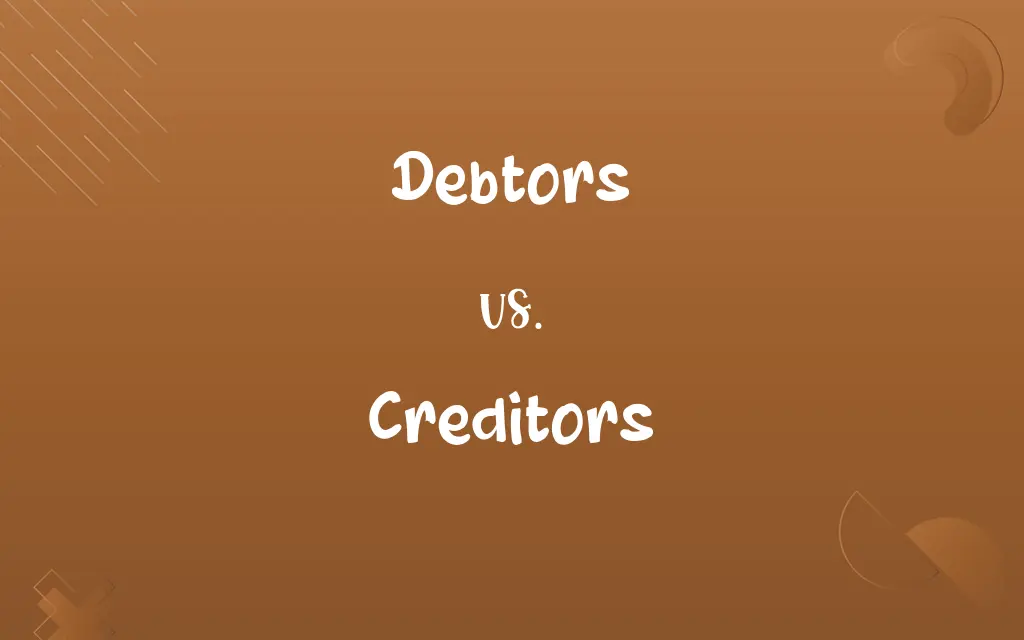Debtors vs. Creditors: Know the Difference

By Shumaila Saeed || Updated on December 25, 2023
Debtors owe money to others, whereas creditors are owed money by others.

Key Differences
Debtors are individuals or entities that borrow money and are obligated to pay it back. They often require funds for various purposes like business expansion or personal needs. Creditors, on the other hand, are those who lend the money or provide credit. They could be banks, financial institutions, or individuals offering loans or credit facilities.
Shumaila Saeed
Nov 22, 2023
In financial transactions, debtors represent the party that receives the benefit upfront, typically in the form of capital, goods, or services, and agrees to settle the debt later. Creditors are the party providing these benefits, doing so with the expectation of future repayment, usually with interest, which serves as their incentive for extending credit or loans.
Shumaila Saeed
Nov 22, 2023
The balance sheet of a debtor shows liabilities, reflecting the amount owed. This could include loans, mortgages, or credit card debts. For creditors, the amounts owed to them are assets, as they represent future cash inflows, either as repayments of principal or interest earnings.
Shumaila Saeed
Nov 22, 2023
The relationship between debtors and creditors is governed by the terms of the credit agreement, which outlines the repayment schedule, interest rates, and consequences of non-payment. Creditors have the right to take legal action to recover their funds if debtors fail to meet their obligations.
Shumaila Saeed
Nov 22, 2023
Debtors may face financial challenges in repaying debts, leading to negotiations for restructuring or refinancing. Creditors must assess the creditworthiness of debtors before lending, to minimize the risk of default and ensure the safety of their funds.
Shumaila Saeed
Nov 22, 2023
ADVERTISEMENT
Comparison Chart
Financial Statement Impact
Liabilities on balance sheet
Assets on balance sheet
Shumaila Saeed
Nov 22, 2023
ADVERTISEMENT
Debtors and Creditors Definitions
Debtors
A debtor is an individual or entity that owes money.
The company became a debtor after taking out a loan to expand its operations.
Shumaila Saeed
Nov 17, 2023
Creditors
Creditors are entities to whom money is owed.
The supplier became a creditor when it provided goods on credit to the retailer.
Shumaila Saeed
Nov 17, 2023
Debtors
Debtors are parties in a financial obligation who have received goods or services but have not yet paid for them.
The retailer listed several customers as debtors in its accounts receivable.
Shumaila Saeed
Nov 17, 2023
Creditors
A creditor is an individual or institution that lends money or extends credit.
The bank acted as a creditor, providing a mortgage for the homebuyer.
Shumaila Saeed
Nov 17, 2023
Debtors
A debtor is someone under legal obligation to repay a borrowed amount.
As a debtor, she had to adhere to the monthly repayment schedule of her car loan.
Shumaila Saeed
Nov 17, 2023
ADVERTISEMENT
Creditors
A creditor is a party in a financial transaction who has a claim to receive payment.
As a creditor, the finance company had a right to receive monthly payments from the borrower.
Shumaila Saeed
Nov 17, 2023
Debtors
Debtors are entities that have incurred debt through borrowing.
Small businesses often become debtors to finance their startup costs.
Shumaila Saeed
Nov 17, 2023
Creditors
Creditors are those who offer credit facilities or loans to others.
The credit card company is a creditor to many individuals who use its credit services.
Shumaila Saeed
Nov 17, 2023
Debtors
A debtor is a party in a credit transaction on the owing side.
After purchasing furniture on credit, John became a debtor to the furniture store.
Shumaila Saeed
Nov 17, 2023
Creditors
A creditor is an entity with a legal right to demand repayment of a debt.
The investor became a creditor to the startup by providing it with seed funding.
Shumaila Saeed
Nov 17, 2023
Repeatedly Asked Queries
What defines a debtor?
A debtor is someone who owes money to another party.
Shumaila Saeed
Nov 22, 2023
Can a company be both a debtor and a creditor?
Yes, a company can be both, owing money to some entities while others owe it money.
Shumaila Saeed
Nov 22, 2023
Do creditors always charge interest?
Most creditors charge interest, but terms can vary based on the agreement.
Shumaila Saeed
Nov 22, 2023
How does being a debtor affect credit score?
Being a debtor can affect a credit score, especially if payments are late or missed.
Shumaila Saeed
Nov 22, 2023
What happens if a debtor can’t pay?
If a debtor can't pay, they may face legal action, restructuring, or bankruptcy proceedings.
Shumaila Saeed
Nov 22, 2023
How do creditors assess whom to lend to?
Creditors assess creditworthiness, financial stability, and repayment history.
Shumaila Saeed
Nov 22, 2023
Who is considered a creditor?
A creditor is an individual or entity that lends money or provides credit.
Shumaila Saeed
Nov 22, 2023
What rights do creditors have?
Creditors have rights to receive payments and take legal action if debts are not paid.
Shumaila Saeed
Nov 22, 2023
Are debtors legally bound to pay their debts?
Yes, debtors are legally obligated to repay their debts as per the agreement terms.
Shumaila Saeed
Nov 22, 2023
What is secured debt?
Secured debt is a loan backed by collateral, reducing risk for the creditor.
Shumaila Saeed
Nov 22, 2023
What is an unsecured creditor?
An unsecured creditor has no claim to specific assets of the debtor if they default.
Shumaila Saeed
Nov 22, 2023
What is bankruptcy for a debtor?
Bankruptcy is a legal process where a debtor is declared unable to repay debts.
Shumaila Saeed
Nov 22, 2023
What is a credit agreement?
A credit agreement is a legal document outlining the terms between debtor and creditor.
Shumaila Saeed
Nov 22, 2023
What is a credit limit?
A credit limit is the maximum amount a creditor allows a debtor to borrow.
Shumaila Saeed
Nov 22, 2023
Can creditors refuse to lend money?
Yes, creditors can refuse to lend based on risk assessment and creditworthiness.
Shumaila Saeed
Nov 22, 2023
How do debtors manage multiple debts?
Debtors manage multiple debts through budgeting, consolidation, or prioritizing payments.
Shumaila Saeed
Nov 22, 2023
How do creditors benefit from lending?
Creditors benefit through interest earnings and potential late fees on loans.
Shumaila Saeed
Nov 22, 2023
Can a debtor renegotiate their debt?
Yes, debtors can sometimes renegotiate terms, especially in financial hardship cases.
Shumaila Saeed
Nov 22, 2023
How do interest rates affect debtors?
Higher interest rates increase the cost of borrowing for debtors.
Shumaila Saeed
Nov 22, 2023
Can creditors sell debts to other parties?
Yes, creditors can sell debts, often to collection agencies.
Shumaila Saeed
Nov 22, 2023
Share this page
Link for your blog / website
HTML
Link to share via messenger
About Author
Written by
Shumaila SaeedShumaila Saeed, an expert content creator with 6 years of experience, specializes in distilling complex topics into easily digestible comparisons, shining a light on the nuances that both inform and educate readers with clarity and accuracy.







































































